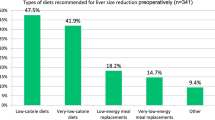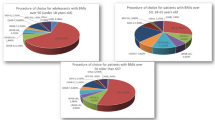Abstract
Background
There is no published data on the factors bariatric surgeons think make bariatric surgery challenging. This study aimed to identify factors that bariatric surgeons feel and increase the technical complexity of bariatric surgery.
Methods
Bariatric surgeons from around the world were invited to participate in a questionnaire-based survey on Survey Monkey®. An Average Weighted Score was calculated for each factor. A score of < 1.0 meant that the factor was perceived to make surgery technically easier.
Results
Three hundred seventy bariatric and metabolic surgeons from 59 countries completed the survey. The top 10 factors that our respondents felt were most important for determining the technical difficulty of a procedure were inappropriate trocar placement (AWS 3.44), BMI above 60 (AWS 3.41), open bariatric surgery (AWS 3.26), less experienced bariatric anesthetist (AWS 3.18), liver cirrhosis (AWS 3), large liver (AWS 2.99), less experienced bariatric assistant (AWS 2.97), lower surgeon total bariatric surgery volume (AWS 2.95), lower surgeon specific procedure volume (AWS 2.85) and previous laparotomy (AWS 2.83), respectively. Respondents also felt that the younger patients (AWS 0.78), dedicated operating team (AWS 0.67), BMI less than 35 (AWS 0.54), and French position (AWS 0.45) actually make the surgery easier.
Conclusion
This survey is the first attempt to understand the factors which make bariatric surgery more difficult. Knowing the factors made the operation more challenging, led to better scheduling the potentially difficult patients to reduce the complications.

Similar content being viewed by others
References
Griffiths EA, Hodson J, Vohra RS et al (2019) Utilisation of an operative difficulty grading scale for laparoscopic cholecystectomy. Surg Endosc 33(1):110–121
Kang SB, Park JS, Kim DW, Lee TG (2010) Intraoperative technical difficulty during laparoscopy-assisted surgery as a prognostic factor for colorectal cancer. Dis Colon Rectum 53(10):1400–1408
Partelli S, Ricci C, Rancoita PMV et al. (2020) Preoperative predictive factors of laparoscopic distal pancreatectomy difficulty . HPB (Oxford), S1365–182X (20)30124–6
Liu P, Li Y, Ding HF et al (2020) A novel preoperative scoring system to predict technical difficulty in laparoscopic splenectomy for non-traumatic diseases. Surg Endosc. https://doi.org/10.1007/s00464-019-07327-3
Fujiwara Y, Lee S, Gyobu K et al (2019) Predictive factors of difficulty of thoracoscopic esophagectomy in the left decubitus position. Esophagus 16(3):316–323. https://doi.org/10.1007/s10388-019-00663-2
Russolillo N, Maina C, Fleres F, Langella S, Lo Tesoriere R, Ferrero A (2020) Comparison and validation of three difficulty scoring systems in laparoscopic liver surgery: a retrospective analysis on 300 cases. Surg Endosc. https://doi.org/10.1007/s00464-019-07345-1
Radak D, Tanaskovic S, Neskovic M (2019) The obesity-associated risk in open and endovascular repair of abdominal aortic aneurysm. Curr Pharm Des 25(18):2033–2037
Kula AO, Riess ML, Ellinas EH (2017) Increasing body mass index predicts increasing difficulty, failure rate, and time to discovery of failure of epidural anesthesia in laboring patients. J Clin Anesth 37:154–158
Eldar SM, Heneghan HM, Brethauer SA et al (2012) Laparoscopic bariatric surgery for those with body mass index of 70–125 kg/m2. Surg Obes Relat Dis 8(6):736–740
Morales MP, Wheeler AA, Ramaswamy A, Scott JS, de la Torre RA (2010) Laparoscopic revisional surgery after Roux-en-Y gastric bypass and sleeve gastrectomy. Surg Obes Relat Dis 6(5):485–490
Bouchard P, Demyttenaere S, Court O, Franco EL, Andalib A (2020) Surgeon and hospital volume outcomes in bariatric surgery: a population-level study. Surg Obes Relat Dis 16(5):674–681
Barbat SD, Thompson KJ, Raheem E, Mckillop IH, Dugan N, Nimeri A (2020) Bariatric surgery outcome when assisted by fellows and; An MBSAQIP analysis of 477,670 patients. Surg Obes Relat Dis. https://doi.org/10.1016/j.soard.2020.01.019
AlSabah S, Al Haddad E, Khwaja H (2018) The prevalence of musculoskeletal injuries in bariatric surgeons. Surg Endosc. https://doi.org/10.1007/s00464-018-6460-1
Carmona J, Higuerey J, Gil D, Castillo M, Escalona V (2018) Physical and mental impact of laparoscopic sleeve gastrectomy on the surgeon: French vs. American positions. A randomized and controlled study. Obes Surg. https://doi.org/10.1007/s11695-018-3496-1
Nguyen N, Longoria M, Gelfand D, Sabio A, Wilson S (2005) Staged laparoscopic roux-en-Y: a novel two-stage bariatric operation as an alternative in the super-obese with massively enlarged liver. Obes Surg 15(7):1077–81
Artuso D, Wayne M, Kaul A, Bairamian M, Teixeira J, Cerabona T (2004) Extremely high body mass index is not a contraindication to laparoscopic gastric bypass. Obes Surg 14(6):750–754
Major P, Stefura T, Waledziak M, Janik M, Pedziwiatr M, Wysock M et al (2019) What makes bariatric operations difficult-results of a national survey. Medicina 55:218. https://doi.org/10.3390/medicina55060218
Mahawar KK, Parmar C, Graham Y, Abouleid A, Carr WR, Jennings N, Schroeder N, Small PK (2016) Routine liver biopsy during bariatric surgery: an analysis of evidence base. Obes Surg 26(1):177–181
Mumtaz K, Lipshultz H, Jalil S, Porter K, Li N, Kelly SG et al (2020) Bariatric surgery in patients with cirrhosis: careful patient and surgery-type selection is key to improving outcomes. Obes Surg. https://doi.org/10.1007/s11695-020-04583-4
Goh GB, Schauer PR, Mccullough AJ (2018) Considerations for bariatric surgery in patients with cirrhosis. World J Gastroenterol 24:3112–3119. https://doi.org/10.3748/wjg.v24.i28.3112
Younus H, Sharma A, Miquel R, Quaglia A, Kanchustambam S, Carswell K et al (2019) Bariatric surgery in cirrhotic patients: is it safe? Obes Surg. https://doi.org/10.1007/s11695-019-04214-7
Hanifah Z, Punchai S, Mccullough A, Dasarathy S, Brethauer S, Aminian A et al (2018) Bariatric surgery in patients with cirrhosis and portal hypertension. Obes Surg. https://doi.org/10.1007/s11695-018-3372-z
Aelfers S, Janssen I, Aarts E, Smids C, Groenen M, Berends F (2018) Inflammatory bowel disease is not a contraindication for bariatric surgery. Obes Surg 28(6):1681–1687. https://doi.org/10.1007/s11695-017-3076-9
Raul Rosenthal, Bashankaev B, Wexner S (2009) Laparoscopic management of inflammatory bowel disease. Digest Diseases 27:560–4. https://doi.org/10.1159/000233298
Karip B, Altun H, Iscan Y, Bazan M, Çelik K, Özcab Y (2014) Difficulties of bariatric surgery after abdominoplasty. Case Rep Surg. https://doi.org/10.1155/2014/620175
Hrabe J, Sherman S, Charlton M, Cromwell J, Byrn J (2014) Effect of BMI on outcomes in proctectomy. Dis Colon Rectum 57:608–615
Bouwman F, Smits A, Lopes A, Das N, Pollard A, Massuger L et al (2015) The impact of BMI on surgical complications and outcomes in endometrial cancer surgery-an institutional study and systematic review of the literature. Gynecol Oncol 139:369–376
Katkhouda N, Moazzez A, Popek S et al (2009) A new and standardized approach for trocar placement in laparoscopic Rouxen-Y gastric bypass. Surg Endosc 23:659–662
Clapp B (2018) Optimal initial trocar placement for morbidly obese patients. J Soc Laparoendosc Surg. https://doi.org/10.4293/JSLS.2017.00101
Boules M, Corcelles R, Guerron AD, Dong M, Diagle C, El-Hayek K et al (2015) The incidence of hiatal hernia and technical feasibility of repair during bariatric surgery. Obes Surg 158:00535–8. https://doi.org/10.1016/j.surg.2015.06.036
Kothari V, Shaligram A, Reynoso J et al (2012) Impact on perioperative outcomes of concomitant hiatal hernia repair with laparoscopic gastric bypass. Obes Surg 22(10):1607–1610. https://doi.org/10.1007/s11695-012-0714-0
Aridi D, Tamim H, Mailhac A, Safadi B (2016) Concomitant hiatal hernia repair with laparoscopic sleeve gastrectomy: analysis of the ACS-NSQIP database. Surg Obes Relat Diseases. https://doi.org/10.1016/j.soard.2016.09.037
Korenkov M (2012) Technical variations and complications. Bariatric surgery. Springer, Berlin
Author information
Authors and Affiliations
Corresponding author
Ethics declarations
Conflict of interest
Drs Shahab Shahabi, Mohammad Kermansaravi, Amirhossein Davarpanah Jazi, Miguel Carbajo, Abdolreza Pazouki, Abdelrahman Nimeri, and Kamal Mahawar have no conflict of interest or financial ties to disclose. There was no funding issue in this paper.
Additional information
Publisher's Note
Springer Nature remains neutral with regard to jurisdictional claims in published maps and institutional affiliations.
Rights and permissions
About this article
Cite this article
Shahabi, S., Carbajo, M., Nimeri, A. et al. Factors that make Bariatric Surgery Technically Challenging: A Survey of 370 Bariatric Surgeons. World J Surg 45, 2521–2528 (2021). https://doi.org/10.1007/s00268-021-06139-8
Accepted:
Published:
Issue Date:
DOI: https://doi.org/10.1007/s00268-021-06139-8




